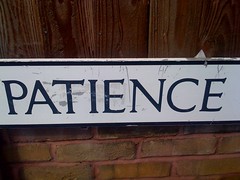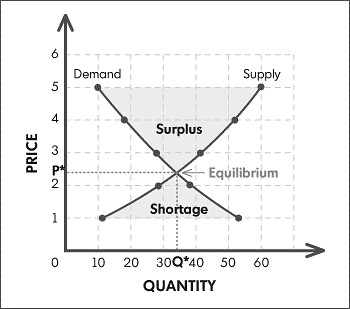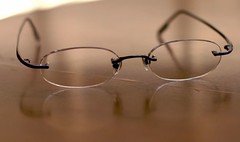Conventional wisdom, at least in frugal personal finance circles says you should wait several days (or even weeks) before making most purchases. Especially large purchases.
Personally, I’m usually a pretty patient purchaser. I hate paying retail for most things. When I decide I need something (or even want it), I usually start my search on eBay. Only when the price on eBay is pretty close to retail, or when I just can’t get something at a discount will I purchase it through a retail outlet. And even then, I generally wait for a sale.
Patience is a Virtue
The main reason that experts suggest that you wait on a purchase is that, after thinking about it for a few days, most people will decide that they don’t need the item, or that they don’t want to spend the money on it right then. It also prevents spontaneous purchases. I seldom find that to be true. Well, not entirely, anyways. There have been a few cases where I’ve decided that I really didn’t want the item. I’m also frugal to a fault, and rarely make a spur-of-the-moment purchase. If I see something that I want, I’m off to research it and find the best price for it.
 Limited Time Offers
Limited Time Offers
LTOs are my downfall. Because of their limited timeline, I don’t have the luxury of waiting until I can do the same amount of research that I normally do. I still have a hard time purchasing the item, but have been known to buckle under the pressure and pull out my card. (That’s a debit card, thank you.) And, that’s the reason that retailers will have LTOs. Put under the pressure of a deadline, people will often put off doing the research they should and purchase on the spot to take advantage of a great deal.
How I Practice Patient Purchasing
Patient purchasing has probably saved me thousands of dollars over the years. Here’s the method that I generally use.
- Decide on the brand and model that you want. This can be the super heavy duty research part of the purchase. I’ll spend time shopping for the item, and then looking online at retailers to find a brand and model that I like as well as get an idea of the average price of the item. e.g. when I last bought a pair of shoes, I first decided on the brand that I wanted to buy (New Balance) and then on the model. Deciding on the model took the most time as they have many models that are built for different strides, pronations, etc. I also found that the full retail for a pair was about $125, but that there were discount retail outlets that regularly sold them for about $100.
- Set up a search on eBay. I like eBay. It gives me the ability to fine tune a search and then save it. I also very rarely find that the price that I can get something for on eBay is more than what I can get it for at a retailer. Most of the time it’s quite a bit less. I usually start with a pretty generic search for the brand and model of the item I’m looking for and then fine tune it based on the other qualifications I’m looking for. e.g. in the case of the shoes, I started with a search for “New Balance 757” and then refined the search with the shoe size, width, and maximum price I was willing to pay.
- Exhibit Patience. This is the part that some people find to be really hard, but that I find comes pretty easily. I wait. I check the saved search every two or three days (auctions can be run in 1,3,7, or 10 day lengths, but I’m willing to miss a few of the 1 day auctions) and add items that look like good possibilities to my watch list. I then sort my watch list by the auctions that are ending soonest, and will place a bid on the first one for the maximum that I am willing to pay. That usually involves figuring out how much shipping will be, subtracting it from the max I’m willing to pay and then bidding the remainder.
Using that method, I can usually get an item that I want at a price that I want. Being patient is key though. Sometimes it can take me weeks to finally win an auction. In the example I used above (shoes), I think it took me about 3 weeks to get a pair of shoes that I wanted at the price I wanted. In the end, I paid just under $60 (including shipping) for a pair of shoes that I would have paid about $125 for at a retail shoe store.
Is the savings I got worth the time I put into it? If you break down the savings and figure out an hourly savings based on the amount of hours I put into getting the shoes, it would probably not be a very good rate. Below minimum wage for sure. But, for the most part, the time I spent on it is time that I likely would have wasted on watching TV or something anyways. In other words, it was non-productive time and therefore had little monetary value associated to it in the first place. I got a new pair of shoes, and saved money doing.
Are you a patient purchaser? What are your methods for buying bigger ticket items?
img credit:gemb1 on Flickr

Shane Ede is a business teacher and personal finance blogger. He holds dual Bachelors degrees in education and computer sciences, as well as a Masters Degree in educational technology. Shane is passionate about personal finance, literacy and helping others master their money. When he isn’t enjoying live music, Shane likes spending time with family, barbeque and meteorology.

 Limited Time Offers
Limited Time Offers In particular, I’d like to point out the last part of that. “determined mainly by competition in a free market”. What drives that competition, and as a result, the free market? The law of supply and demand. In the law of supply and demand, the prices of goods and services are determined by the supply that exists for a good or service, and the demand that exists for that same good or service. If demand is high for something, and the supply is low, or limited, the people who have the supply can charge more because the ratio of supply to demand is higher. But, what about something like a doctors visit? Doctors aren’t exactly in a low enough supply to warrant higher prices. While our insurance companies are able to negotiate cheaper prices for services with a doctor, we very rarely will even ask if there’s a better rate. And, we’ll willingly sit in a waiting room for extended periods of time, which, anyone familiar with the concept of time cost will tell you, costs money.
In particular, I’d like to point out the last part of that. “determined mainly by competition in a free market”. What drives that competition, and as a result, the free market? The law of supply and demand. In the law of supply and demand, the prices of goods and services are determined by the supply that exists for a good or service, and the demand that exists for that same good or service. If demand is high for something, and the supply is low, or limited, the people who have the supply can charge more because the ratio of supply to demand is higher. But, what about something like a doctors visit? Doctors aren’t exactly in a low enough supply to warrant higher prices. While our insurance companies are able to negotiate cheaper prices for services with a doctor, we very rarely will even ask if there’s a better rate. And, we’ll willingly sit in a waiting room for extended periods of time, which, anyone familiar with the concept of time cost will tell you, costs money. Start by shopping around. Just because your optometrist is your eye doctor doesn’t mean you need to purchase all of your eye related devices there. The doctor already has gotten paid for the visit. No other compensation for their time and the visit are necessary. Most towns will have at least two optometrists, and bigger cities will likely have 10-20 or more. Bigger cities may also have at least one of the new discount eyeglasses stores that have been popping up recently. Take your prescription home, then call a few of them and ask about prices for the eyeglasses you need.
Start by shopping around. Just because your optometrist is your eye doctor doesn’t mean you need to purchase all of your eye related devices there. The doctor already has gotten paid for the visit. No other compensation for their time and the visit are necessary. Most towns will have at least two optometrists, and bigger cities will likely have 10-20 or more. Bigger cities may also have at least one of the new discount eyeglasses stores that have been popping up recently. Take your prescription home, then call a few of them and ask about prices for the eyeglasses you need.